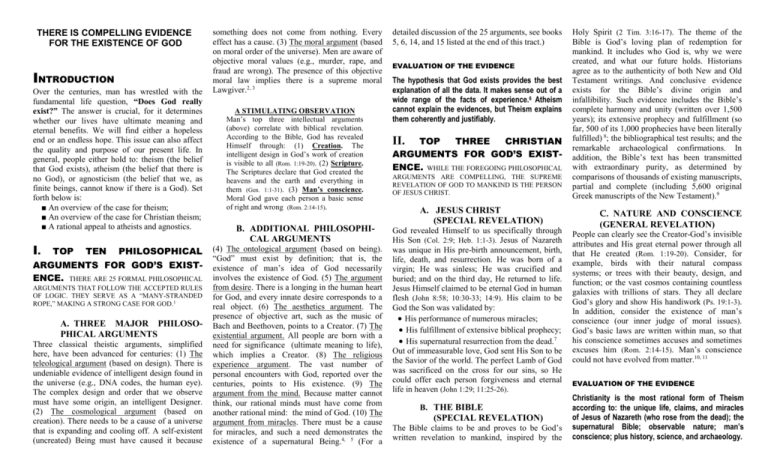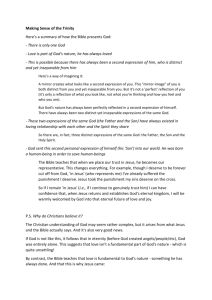
THERE IS COMPELLING EVIDENCE
FOR THE EXISTENCE OF GOD
INTRODUCTION
Over the centuries, man has wrestled with the
fundamental life question, “Does God really
exist?” The answer is crucial, for it determines
whether our lives have ultimate meaning and
eternal benefits. We will find either a hopeless
end or an endless hope. This issue can also affect
the quality and purpose of our present life. In
general, people either hold to: theism (the belief
that God exists), atheism (the belief that there is
no God), or agnosticism (the belief that we, as
finite beings, cannot know if there is a God). Set
forth below is:
■ An overview of the case for theism;
■ An overview of the case for Christian theism;
■ A rational appeal to atheists and agnostics.
I.
TOP
TEN
PHILOSOPHICAL
ARGUMENTS FOR GOD’S EXISTENCE. THERE ARE 25 FORMAL PHILOSOPHICAL
ARGUMENTS THAT FOLLOW THE ACCEPTED RULES
OF LOGIC. THEY SERVE AS A “MANY-STRANDED
ROPE,” MAKING A STRONG CASE FOR GOD.1
A. THREE MAJOR PHILOSOPHICAL ARGUMENTS
Three classical theistic arguments, simplified
here, have been advanced for centuries: (1) The
teleological argument (based on design). There is
undeniable evidence of intelligent design found in
the universe (e.g., DNA codes, the human eye).
The complex design and order that we observe
must have some origin, an intelligent Designer.
(2) The cosmological argument (based on
creation). There needs to be a cause of a universe
that is expanding and cooling off. A self-existent
(uncreated) Being must have caused it because
something does not come from nothing. Every
effect has a cause. (3) The moral argument (based
on moral order of the universe). Men are aware of
objective moral values (e.g., murder, rape, and
fraud are wrong). The presence of this objective
moral law implies there is a supreme moral
Lawgiver.2, 3
A STIMULATING OBSERVATION
Man’s top three intellectual arguments
(above) correlate with biblical revelation.
According to the Bible, God has revealed
Himself through: (1) Creation. The
intelligent design in God’s work of creation
is visible to all (Rom. 1:19-20). (2) Scripture.
The Scriptures declare that God created the
heavens and the earth and everything in
them (Gen. 1:1-31). (3) Man’s conscience.
Moral God gave each person a basic sense
of right and wrong (Rom. 2:14-15).
B. ADDITIONAL PHILOSOPHICAL ARGUMENTS
(4) The ontological argument (based on being).
“God” must exist by definition; that is, the
existence of man’s idea of God necessarily
involves the existence of God. (5) The argument
from desire. There is a longing in the human heart
for God, and every innate desire corresponds to a
real object. (6) The aesthetics argument. The
presence of objective art, such as the music of
Bach and Beethoven, points to a Creator. (7) The
existential argument. All people are born with a
need for significance (ultimate meaning to life),
which implies a Creator. (8) The religious
experience argument. The vast number of
personal encounters with God, reported over the
centuries, points to His existence. (9) The
argument from the mind. Because matter cannot
think, our rational minds must have come from
another rational mind: the mind of God. (10) The
argument from miracles. There must be a cause
for miracles, and such a need demonstrates the
existence of a supernatural Being.4, 5 (For a
detailed discussion of the 25 arguments, see books
5, 6, 14, and 15 listed at the end of this tract.)
EVALUATION OF THE EVIDENCE
The hypothesis that God exists provides the best
explanation of all the data. It makes sense out of a
wide range of the facts of experience.6 Atheism
cannot explain the evidences, but Theism explains
them coherently and justifiably.
TOP
THREE
CHRISTIAN
ARGUMENTS FOR GOD’S EXISTENCE. WHILE THE FOREGOING PHILOSOPHICAL
II.
ARGUMENTS ARE COMPELLING, THE SUPREME
REVELATION OF GOD TO MANKIND IS THE PERSON
OF JESUS CHRIST.
A. JESUS CHRIST
(SPECIAL REVELATION)
God revealed Himself to us specifically through
His Son (Col. 2:9; Heb. 1:1-3). Jesus of Nazareth
was unique in His pre-birth announcement, birth,
life, death, and resurrection. He was born of a
virgin; He was sinless; He was crucified and
buried; and on the third day, He returned to life.
Jesus Himself claimed to be eternal God in human
flesh (John 8:58; 10:30-33; 14:9). His claim to be
God the Son was validated by:
His performance of numerous miracles;
His fulfillment of extensive biblical prophecy;
His supernatural resurrection from the dead.7
Out of immeasurable love, God sent His Son to be
the Savior of the world. The perfect Lamb of God
was sacrificed on the cross for our sins, so He
could offer each person forgiveness and eternal
life in heaven (John 1:29; 11:25-26).
B. THE BIBLE
(SPECIAL REVELATION)
The Bible claims to be and proves to be God’s
written revelation to mankind, inspired by the
Holy Spirit (2 Tim. 3:16-17). The theme of the
Bible is God’s loving plan of redemption for
mankind. It includes who God is, why we were
created, and what our future holds. Historians
agree as to the authenticity of both New and Old
Testament writings. And conclusive evidence
exists for the Bible’s divine origin and
infallibility. Such evidence includes the Bible’s
complete harmony and unity (written over 1,500
years); its extensive prophecy and fulfillment (so
far, 500 of its 1,000 prophecies have been literally
fulfilled) 8; the bibliographical test results; and the
remarkable archaeological confirmations. In
addition, the Bible’s text has been transmitted
with extraordinary purity, as determined by
comparisons of thousands of existing manuscripts,
partial and complete (including 5,600 original
Greek manuscripts of the New Testament).9
C. NATURE AND CONSCIENCE
(GENERAL REVELATION)
People can clearly see the Creator-God’s invisible
attributes and His great eternal power through all
that He created (Rom. 1:19-20). Consider, for
example, birds with their natural compass
systems; or trees with their beauty, design, and
function; or the vast cosmos containing countless
galaxies with trillions of stars. They all declare
God’s glory and show His handiwork (Ps. 19:1-3).
In addition, consider the existence of man’s
conscience (our inner judge of moral issues).
God’s basic laws are written within man, so that
his conscience sometimes accuses and sometimes
excuses him (Rom. 2:14-15). Man’s conscience
could not have evolved from matter.10, 11
EVALUATION OF THE EVIDENCE
Christianity is the most rational form of Theism
according to: the unique life, claims, and miracles
of Jesus of Nazareth (who rose from the dead); the
supernatural Bible; observable nature; man’s
conscience; plus history, science, and archaeology.
A RATIONAL APPEAL
ATHEISTS AND AGNOSTICS.
III.
TO
“If there is a God of infinite goodness, and He
justly deserves my allegiance and faith,
I risk doing the greatest injustice by not
acknowledging Him.” (Peter Kreeft)14
A. PASCAL’S WAGER
(a plea to the atheist)
Blaise Pascal, a 17th century French mathematical
genius, posed this question: What will happen at
death according to atheism and theism? (1) If
there is no God, there is no payoff at the end,
whether we wager for or against the existence of
God. For we neither gain nor lose anything if we
do not exist. (2) But if there is a God, the wager to
believe in Him (and make peace with Him during
our lifetime) offers us an infinite payoff—eternal
life in joy with God! Thus, atheism is a no-win
bet. Faith is a no-lose bet. Even if the evidences
for and against God were nearly equal, it would
still be rational and wise to wager that God
exists, for there is nothing to lose and everything
to gain.12
B. PASCAL’S ANALOGY
(a plea to the agnostic)
The agnostic may refuse to place a wager on the
existence of God until the evidence is clearer.
However, he cannot afford to wait! As Pascal
wrote, the “ship of self” has embarked. It is
moving along the waters of time past the port of
God. The fog will only clear when it’s too late—
after death. The ship has a finite amount of fuel,
and there’s a point of no return. To every question
there are three possible answers: yes, no, and
wait. But death eliminates the third answer.13
[Note: According to the Bible, the agnostic will
receive ample evidence after praying to receive
Jesus Christ. God’s Holy Spirit will come to dwell
within him, He will confirm to his spirit he is a
true child of God, then He will guide him into all
truth (Rom. 8:11, 16; John 16:13).]
THE UNIVERSE IS A FINELY TUNED
MECHANISM
“Over the past thirty years or so, scientists have
discovered that just about everything about the
basic structure of the universe [e.g., gravity] is
balanced on a razor’s edge for life to exist …
The dials are set too precisely to have been a
random accident.” (Robin Collins, Ph.D.) 15
CONCLUSION
To believe that God exists is both prudent and
wise. The stakes are high. Belief in God
provides life, hope, and significance over death,
despair, and meaninglessness.16 A profound and
relevant question posed to each of us by Jesus
Christ, out of His incomparable love, is: “For
what will it profit a man if he gains the whole
world, and loses his own soul?” (Mark 8:36).
What if a person gained the wealth of the world
during his brief earthly years, but lost eternal
life? God is not willing that anyone should
perish (2 Peter 3:9). On the cross, His Son paid
the tremendous price for every person to choose
life. Are you ready to believe in God and
receive Jesus Christ as your personal Lord and
Savior?
“For God so loved the world that He
gave [sacrificed] His only
begotten Son [Jesus],
that whoever believes in Him should
not perish but have everlasting life.”
John 3:16
A PRAYER TO RECEIVE JESUS CHRIST
AS LORD AND SAVIOR
“Dear Father God, thank You for sending
Your Son to die on the cross for my sins
and to rise again, so I can live with You
eternally. Thank You for forgiving my sins.
I receive Jesus as my personal Lord and
Savior. Help me to grow in my personal
relationship with You, through Your Son,
now and forever. In Jesus’ name, amen.”
A PRAYER FOR THE SKEPTIC
(to test the religious hypothesis)
“God, I don’t know if You exist or not. I
might be only talking to a myth or fantasy,
but I’m not sure. So if You do exist, You
can hear me now, and You know me and
my heart. You supposedly promised that
all who seek You will find You. If You are
the truth, I’m honestly seeking You now.
So please let me know You’re real, in Your
own way and Your own time. I’m open
and ready if You are.”17
TRUE-WAY TRACTS®
P. O. Box 1258
San Juan Capistrano, CA 92675
www.truewaytracts.com
REFERENCES: 1 Moreland, J. P. and Kai Nielsen. Does God Exist?
Prometheus Books, © 1993, 240. 2 Geisler, Norman and Ronald
Brooks. When Skeptics Ask, SP Publications, © 1990, 22. 3 Craig,
William Lane. Reasonable Faith, Crossway Books, © 1994 (Chap.
3). 4 Moreland & Nielsen, 27–28. 5 Moreland, J. P. Scaling the
Secular City, Baker Book House, © 1987 (Chap. 1–3). 6 Craig,
William Lane. God, Are You There? RZIM Ministries, © 1999, 11. 7
Ibid, 41–50. 8 Walvoord, John F. Every Prophecy of the Bible, Cook
Communications, © 1999, 7. 9 McDowell, Josh. The New Evidence
that Demands a Verdict, Thomas Nelson, © 1999, 34. 10 Moreland &
Nielsen, p. 36. 11 Geisler, 22–24. 12 Moreland & Nielsen, 289–90. 13
Ibid, 290. 14 Kreeft, Peter and Ron Tarcelli. Handbook of Christian
Apologetics, IVP, © 1994, 86. 15 Strobel, Lee. The Case for a
Creator, Zondervan, © 2004, 131. 16 Craig (GAYT) 7. 17 Moreland
& Nielsen, 291.
All Scripture quotations in this publication are from the New King
James Version. Copyright l982 by Thomas Nelson Inc. Used by
permission. All rights reserved.
For the Seeker with
Valid Questions
How Can
We Know
If
God Exists?
Biblical Christianity
by m.j. tyner, m.a.
christian apologetics










